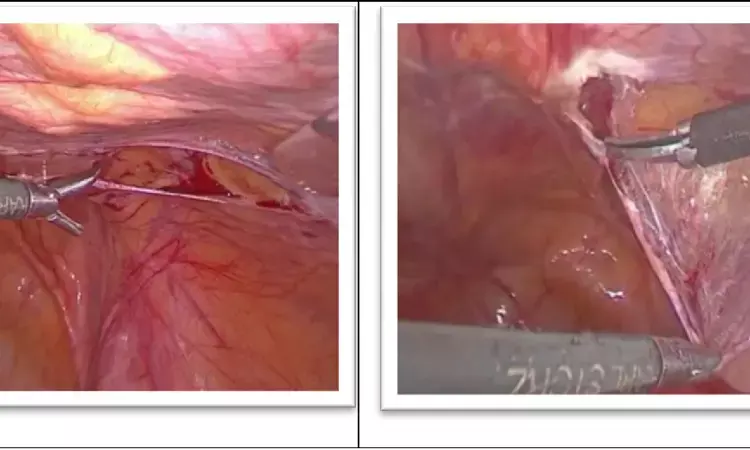- Home
- Medical news & Guidelines
- Anesthesiology
- Cardiology and CTVS
- Critical Care
- Dentistry
- Dermatology
- Diabetes and Endocrinology
- ENT
- Gastroenterology
- Medicine
- Nephrology
- Neurology
- Obstretics-Gynaecology
- Oncology
- Ophthalmology
- Orthopaedics
- Pediatrics-Neonatology
- Psychiatry
- Pulmonology
- Radiology
- Surgery
- Urology
- Laboratory Medicine
- Diet
- Nursing
- Paramedical
- Physiotherapy
- Health news
- Fact Check
- Bone Health Fact Check
- Brain Health Fact Check
- Cancer Related Fact Check
- Child Care Fact Check
- Dental and oral health fact check
- Diabetes and metabolic health fact check
- Diet and Nutrition Fact Check
- Eye and ENT Care Fact Check
- Fitness fact check
- Gut health fact check
- Heart health fact check
- Kidney health fact check
- Medical education fact check
- Men's health fact check
- Respiratory fact check
- Skin and hair care fact check
- Vaccine and Immunization fact check
- Women's health fact check
- AYUSH
- State News
- Andaman and Nicobar Islands
- Andhra Pradesh
- Arunachal Pradesh
- Assam
- Bihar
- Chandigarh
- Chattisgarh
- Dadra and Nagar Haveli
- Daman and Diu
- Delhi
- Goa
- Gujarat
- Haryana
- Himachal Pradesh
- Jammu & Kashmir
- Jharkhand
- Karnataka
- Kerala
- Ladakh
- Lakshadweep
- Madhya Pradesh
- Maharashtra
- Manipur
- Meghalaya
- Mizoram
- Nagaland
- Odisha
- Puducherry
- Punjab
- Rajasthan
- Sikkim
- Tamil Nadu
- Telangana
- Tripura
- Uttar Pradesh
- Uttrakhand
- West Bengal
- Medical Education
- Industry
Laparoscopic TEP surgical approach as effective as laparoscopic TAPP for bilateral inguinal hernia repair

A laparoscopic TEP surgical approach as effective as laparoscopic TAPP for bilateral inguinal hernia repair suggests a new study published in the BMC Surgery
The guidelines recommend laparoscopic repair for bilateral inguinal hernia. However, few studies compare the totally extraperitoneal (TEP) and transabdominal preperitoneal (TAPP) techniques in bilateral inguinal hernias. This study aimed to compare the outcomes of TEP and TAPP in bilateral inguinal hernia.
Researchers conducted a retrospective cohort study of patients operated on for bilateral inguinal hernia by TEP and TAPP repair from 2016 to 2020. Intraoperative complications, operative time, acute postoperative pain, hospital stay, postoperative complications, chronic inguinal pain, and recurrence were compared.
Results
A total of 155 patients were included in the study. TEP was performed in 71 patients (46%) and TAPP in 84 patients (54%). The mean operative time was longer in the TAPP group than in the TEP group (107 min vs. 82 min, p < 0.001). The conversion rate to open surgery was higher in the TEP group than in the TAPP group (8.5% vs. 0%, p = 0.008). The mean hospital stay was longer in the TAPP group than in the TEP group (p < 0.001). We did not observe significant differences in the proportion of postoperative complications (p = 0.672), postoperative pain at 24 h (p = 0.851), chronic groin pain (p = 0.593), and recurrence (p = 0.471). We did not observe an association between the choice of surgical technique (TEP vs. TAPP) with conversion rate, operative time, hospital stay, postoperative complications, chronic inguinal pain, or hernia recurrence when performing a multivariable analysis adjusted for the male sex, age, BMI, ASA, recurrent hernia repair, surgeon, and hernia size > 3cm.
Bilateral inguinal hernia repair by TEP and TAP presented similar outcomes in the study.
Reference:
Hidalgo, N.J., Guillaumes, S., Bachero, I. et al. Bilateral inguinal hernia repair by laparoscopic totally extraperitoneal (TEP) vs. laparoscopic transabdominal preperitoneal (TAPP). BMC Surg 23, 270 (2023). https://doi.org/10.1186/s12893-023-02177-2
Keywords:
Laparoscopic, TEP, surgical, approach, effective, laparoscopic, TAPP, bilateral, inguinal, hernia repair, BMC Surgery, Hidalgo, N.J., Guillaumes, S., Bachero, I.
Dr. Shravani Dali has completed her BDS from Pravara institute of medical sciences, loni. Following which she extensively worked in the healthcare sector for 2+ years. She has been actively involved in writing blogs in field of health and wellness. Currently she is pursuing her Masters of public health-health administration from Tata institute of social sciences. She can be contacted at editorial@medicaldialogues.in.
Dr Kamal Kant Kohli-MBBS, DTCD- a chest specialist with more than 30 years of practice and a flair for writing clinical articles, Dr Kamal Kant Kohli joined Medical Dialogues as a Chief Editor of Medical News. Besides writing articles, as an editor, he proofreads and verifies all the medical content published on Medical Dialogues including those coming from journals, studies,medical conferences,guidelines etc. Email: drkohli@medicaldialogues.in. Contact no. 011-43720751


